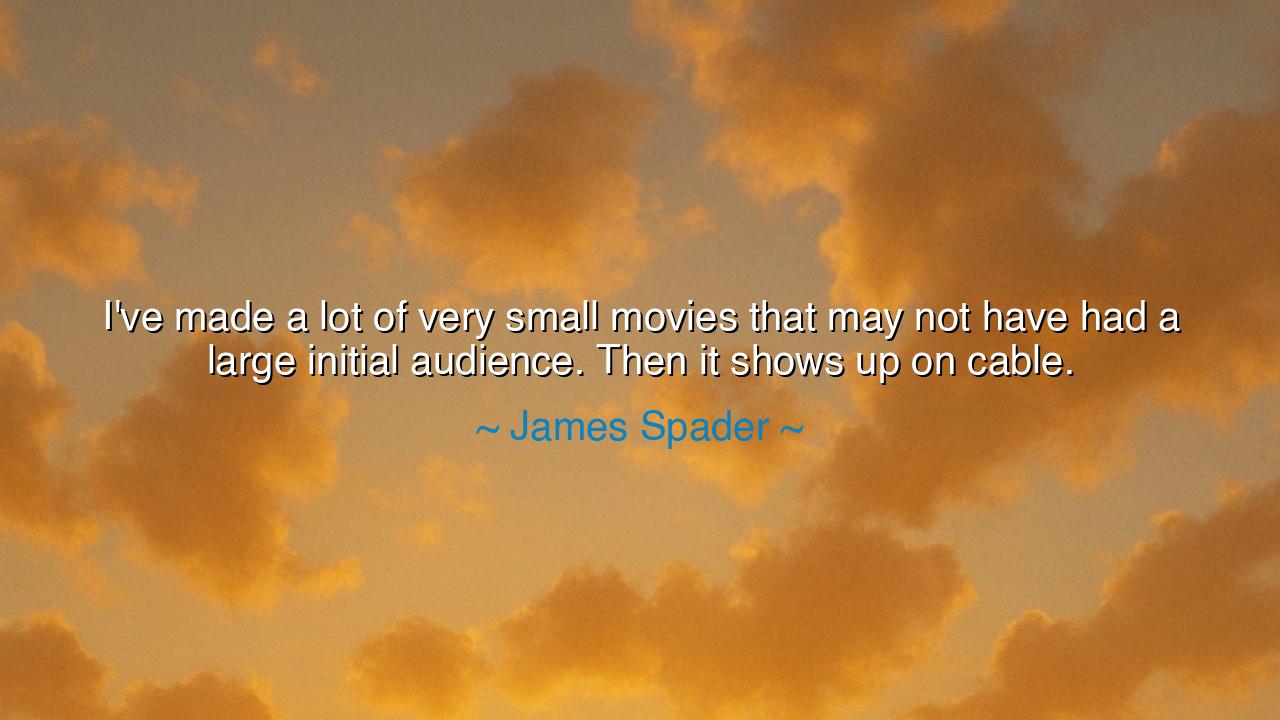
I've made a lot of very small movies that may not have had a
I've made a lot of very small movies that may not have had a large initial audience. Then it shows up on cable.






In the vast unfolding of time, we see how the smallest of actions can sometimes spark the most profound consequences. James Spader, in his reflection on the nature of his films, offers a truth that resonates deeply with the artist and the creator: "I've made a lot of very small movies that may not have had a large initial audience. Then it shows up on cable." These words reflect the notion that greatness often grows not from immediate acclaim but from the quiet, persistent journey of creation. Like the ancient seed that is planted in the soil, it may not seem much at first, but in time, its significance grows, often in ways the creator cannot predict. Spader's story is not just one about cinema but about the life cycle of creativity itself.
In the ancient world, the stories of heroes and philosophers often did not find their full audience immediately. Consider the great works of Homer—the Iliad and the Odyssey. These works, though monumental today, were not initially regarded as the foundations of Western literature that we now know them to be. It was only over time, through repeated recitation and reflection, that their true value was realized. Homer’s epic tales, passed down through generations, grew in stature, not because they were immediately popular, but because they spoke to the deepest truths of the human experience—honor, fate, loss, and love. Similarly, Spader's films may not have captured large audiences at first, but as they are rediscovered, they find new meaning and value in the eyes of those who come across them.
This process mirrors the story of many great artists throughout history. Vincent van Gogh, for example, painted tirelessly, yet his work was largely unappreciated during his lifetime. It was only posthumously that his paintings began to gain the recognition they deserved. His masterpieces, now regarded as some of the most important in the world, were once viewed as mere splashes of paint, unrecognized and dismissed. Spader’s words echo this timeless cycle—an artist creates, sometimes without immediate recognition, but with faith in the process, knowing that in time, their work may find its way to those who will appreciate it, just as van Gogh’s did.
Similarly, in the ancient world, philosophers like Socrates were often met with skepticism or outright disdain by the masses. Socrates did not write down his thoughts, leaving the world to rely on the words of his disciples, such as Plato. Only later did his philosophy resonate with generations of thinkers, shaping the very foundation of Western thought. In this way, the true measure of an artist’s or a philosopher's worth does not always lie in immediate success or recognition, but in the lasting impact of their work. Spader's films, though initially small and unseen, have the potential to resonate deeply with future audiences, just as Socrates’ words, passed down through time, shaped the minds of the greatest thinkers.
This brings us to a deeper truth: in the realm of creativity, patience and perseverance are key. The great artists of history, whether in painting, philosophy, or cinema, all understood that their work may not yield immediate rewards. Michelangelo, in his sculpting of the David, did not rush to complete his work in a day. The process itself was slow, deliberate, and at times, frustrating, but the masterpiece that emerged was worth the time and effort. Spader’s statement reminds us that the creative journey is rarely about instant recognition, but about faith in the long-term value of one’s work. The true beauty of art, like the marble of Michelangelo's statues, is revealed over time—through reflection, rediscovery, and the passing of generations.
The lesson here is not just for those in the arts, but for all who pursue passion and purpose. Do not be disheartened if your efforts go unnoticed in the present; often, it is the quiet work done away from the spotlight that bears the greatest fruit. Just as small films, like Spader’s, can find their way to new audiences through cable and repetition, so too can the quiet seeds of your own work grow into something powerful and transformative over time.
As you walk the path of creation, remember Spader's words. Understand that the value of your work may not be recognized immediately, but with persistence and faith in your craft, your contributions will find their place in the larger story. Just as great works of art have waited patiently for their moment to shine, so too will your efforts one day be seen for their true worth. Stay committed, keep creating, and trust that in time, your work will find its audience and leave its mark on the world.






AAdministratorAdministrator
Welcome, honored guests. Please leave a comment, we will respond soon